Getting the treatment at County-USC
- Share via
‘THIS IS THE county hospital,” they would say. They would take one look at me and would seem to feel that an explanation was required, a preface for whatever arcane rule or routine humiliation it was their duty to inform me of. “This is the reality,” they would add, repeating the phrase like a mantra, voiced with dull defiance, resignation and apology.
I heard those words from an ER nurse, a surgeon, an X-ray technician and a county police officer. And I never heard them addressed to anyone but me. My girlfriend had broken her ankle and needed surgery. She was between jobs and between health insurance plans. We couldn’t afford the thousands of dollars the surgery would have cost at a private hospital. So I bundled her up at 4 o’clock one cold morning in January, drove to Boyle Heights and checked her in at the emergency room at L.A. County-USC. (That’s the best time to go, a friend had advised. And it was. After just five hours, a gurney opened up.)
I was usually one of the only white people on our side of the patient-staff divide. (My girlfriend, who is Chicana, entertained herself by keeping her mouth shut as long as she could in order to watch staffers’ attitudes change when they learned she could speak English.) The subtext to those oft-repeated phrases was that all the broken black and brown bodies around me, well, they were where they should be. Only I, with my blue eyes and light skin and the privilege that accompanies those features, required an introduction to this sort of indignity.
Once you get past the emergency room, friends assured us, the quality of care at County-USC is quite good. And it was, if you could ignore the previous patient’s bloody bandages left on the base of your gurney, or the towels stained with urine — some wet, some already dry — that covered the floor of the bathroom on the ward. The doctors, when you saw them, were attentive enough. But seeing a doctor was no easy task.
When you are released from the county hospital after orthopedic surgery, you are given an appointment at the outpatient clinic next door for a follow-up exam. Your appointment is for 8 a.m. If you are lucky, a nurse will explain that, strictly speaking, it is not an appointment at all. The clinic opens at 8. One doctor told me that the orthopedic clinic usually sees at least 150 patients a day. Everyone is given the same 8 a.m. appointment: First come, first served.
On the morning of my girlfriend’s first clinic appointment, we arrived at 6:40 am. It was still dark and cold outside. Five people were already in line ahead of us: one in a wheelchair, the rest with crutches, canes or walkers. There was nowhere to sit but the cold concrete. At 7, someone opened the door, and we filed in and formed a new line outside the clinic door. Again there was no bench and not a single chair — although everyone waiting had an injured leg, knee, ankle, foot, hip or spine, except for the lucky few with broken arms. At least it was warm. A few minutes later, a crowd from another entrance appeared across the hall. In wheelchairs and on crutches, patients were literally racing to take a place in line, hobbling forward with whatever strength they had. The hallway behind us filled within a minute.
An hour later, the clinic opened. Inside there were narrow wooden benches, but not enough of them. Patients stretched out on the floor and waited for their names to be called. The doctors wouldn’t arrive until 10. We were near the head of the line, and that day we got service after 5 1/2 hours.
We’ve left each clinic visit exhausted. Not by the long wait or the early hours but by rage and a choking sense of impotence. The crisis is far bigger than the county hospital, I know. And county politics are famously complex. But the real and simple problem is that the patients in the county system are no one’s favorite constituents. They don’t write for this newspaper. They don’t hold seats on the Board of Supervisors. They don’t host campaign dinners or sign big checks, and here, in one of the wealthiest cities in the world, dignity does not come cheap.
More to Read
Sign up for Essential California
The most important California stories and recommendations in your inbox every morning.
You may occasionally receive promotional content from the Los Angeles Times.










